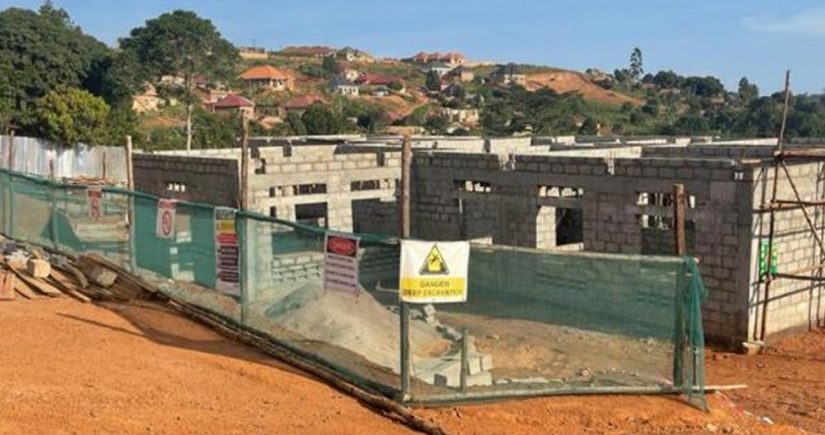CoST Uganda is pleased to publish its “5th Assurance Report; A call for better Disclosure and Public Engagement” on, 26th September 2022. The assurance process spanned through ten (10) projects under Ministry of Health (MoH). The projects are worth Ugx. 71,279,389,380/approximately USD 19 Million with the exception of one project (Lacor) whose financial details were not disclosed. These projects were selected by CoST Uganda and the MoH following a rigorous and detailed review of projects handled and proactively disclosed by MoH in the year 2021 as part of the Covid-19 response.
The projects under the 5th assurance exercise for MoH include those funded by the Government of Uganda and the International Development Association (IDA) under the World Bank Group. The assurance report covers three projects under the Uganda Inter-Governmental Fiscal Transfer project (UgIFT), three projects under the Uganda Reproductive Maternal and Child Health Services Improvement Project (URMCHIP) and four projects under the East Africa Public Health Laboratories Network Project.
| UgIFT projects
a. Nkombe Health Centre (II) – Mayuge district b. Bubago Health Centre (II) – Kamuli district c. Buyinda Health Centre (II) – Kaliro district |
URMCHIP projects
a. Kyebando Health Centre – Kibaale district b. Kitabazi Health Centre – Masaka district c. Kifamba Health Centre – Rakai district |
| East Africa Public Health Laboratories Network Project (EAPHLNP) – Construction of satellite laboratories FY 2019/20
a. Mbale Regional Referral Hospital b. Arua Regional Referral hospital c. Mbarara Regional referral hospital d. St Mary’s Lacor Hospital |
|
Table showing project sites assured
Findings from the 5th Assurance Process
From the 5th Assurance process, we note that, the Ministry of Health has continued to be receptive to transparency and accountability initiatives, especially upon engagement, and has exhibited readiness to address concerns and recommendations from CoST. However, this assurance process calls for better disclosure and public engagement.
Key findings from the 5th Assurance Process include;
- Disclosure of data by the Ministry of Health has declined from 73% in 2019 to 64% in 2021. Proactive disclosure has recorded a decline from 55% in 2020 to 50% in 2021 whereas the disclosure of reactive data has greatly improved from 26% in 2020 to 77% in 2021.
- Local Governments performed poorly in disclosure compared to the Ministry of Health. They also expressed concerns regarding limited access to contract information.
- Mbale Regional Referral Hospital registered time overruns of 18 months, while engagements across the other nine projects revealed that progress of works was low compared to the expectations indicating possible time extensions for Arua, Kyebando, Kitabazi, Kifamba and Bubago Health Centres among others.
- There were no cost overruns reported for the UgIFT and URMCHIP projects, however, a total of Ugx 2,571,393,446 was reported as cost overruns for East African Public Networking Laboratory projects that is; Mbale Regional Referral registered a cost overrun of UGX 831,756,598, Arua RRH UGX 859,919,331, Mbarara RRH UGX 792,017,517, while Lacor hospital registered an overrun of UGX 87,700,000. Variations were attributed to changes in specifications and design changes.
- Inclusiveness in public contracting is still weak, no contracts were issued to special interest groups such as women and youth, however, the entities endeavoured to mainstream gender, HIV/AIDS awareness although on a few projects.
- There were specific project concerns observed during site visits including an incomplete lab, use of single swing doors contrary to double leaf doors, lack of a wall guard and lack of kick plates on the doors where they existed, they were dysfunctional in Mbarara RRH, incomplete emergency exit in Arua, use of an open-air incineration pit in Buyinda. Whereas there was no site access to Nkombe, the site also had incomplete works including painting and finishes to worktops, unconfirmed health and safety concerns among other identified snags.
The 5th Assurance Process recommends that;
- The Ministry of Health strengthens documentation, archiving and publication of project and contract information such as project reports, evaluation reports, list of bidders and audit reports. This should include status of action on recommendations from these reports.
- The communications and procurement teams of the MoH and the local governments make efforts to regularly collect and publish proactive data through the E-GP and GPP and other public platforms in the interest of promoting transparency.
- The Ministry of Finance and PPDA fast track development and roll out of the E-GP across all entities to increase disclosure of critical project and contract data across all stakeholders. The EGP should also be aligned to international data standards to enhance its credibility in information management and disclosure.
- The MoH put in-place an emergency project management plan in response to delays that arose from the Covid-19 pandemic and procurement. Successful strategies include the use of Integrated Project Delivery (IPD) as an innovative delivery system promoting transparency, accountability and trust among stakeholders.
- Fast track implementation of work schedules, supervision of execution of works is in place across all the projects to mitigate cost extensions, strengthen compliance, data verification and reporting on health and safety requirements and improve project planning and initiation processes such as feasibility studies to inform effective designs and budgeting.
- While some QC measures were observed, the QA/QC processes need to be strengthened. The MoH is encouraged to put in place a Quality Information Management system that would enable her better monitor and manage the quality processes. The use of Open-air incinerator pits should be replaced with alternative sustainable solutions such as Drum or Brick incinerators.
- The Department of Health infrastructure is encouraged to fast-track the development and launch of the Quality Information Management system for infrastructure projects.
- The MoH is encouraged to inspect the sites, work with contractors and consultants to identify the snags and rectify them.
